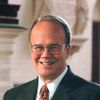I'd like to tell you a little bit about the Alliance of Confessing Evangelicals. It is a little hard to know exactly what to say because we have so many concerns. Years ago I was involved in something very similar to this, called the International Council on Biblical Inerrancy, where we also had a council and we called a meeting much like this one in Chicago. But compared to what we are concerned about here, the task that we were faced with at ICBI was a breeze. We only had a single issue. It was the inerrancy of the Bible, and our goal was to lift that up as a doctrine without which you lose the full authority of Scripture.
But our problem here is to talk about the weakness of the evangelical church as we see it, and that's not just a single issue, it is a very complex and widespread matter. To put it in a word, it is the lack of theology in the church. People who have done surveys, like Gallup and Barna, have come back with statistics that just scare us to death. We cannot believe there is so much ignorance of basic theology out there. And as a result or consequence of that lack of a well-defined theology, we find evangelicals buying into all of the world's ways of doing things. I sometimes say what you've got in the evangelical church today is what a generation ago the liberal church was guilty of. They were guilty of pursuing the world's theology, the world's wisdom, the world's agenda, and the world's methods. And as I look at the contemporary situation today it seems to me that that is exactly what has happened with evangelicals. We have the world's theology: people are basically good and all by ourselves we can choose to get into heaven or not–we don't really need grace. And if we talk about faith, sure it is good but works have to be added to it; you at least maintain yourself in a state of grace by your works. All this gets to be Roman Catholic theology before long. When you go down all the distinctives of the Protestant Reformation not only do you find that evangelicals fail to understand these basic doctrines, but in the opinion of many of us, they have slipped back just to where the church was in the middle ages before the time of Martin Luther. So that's the kind of thing that concerns us and the kind of thing we want to deal with here.
Let me say a couple things about the location. We picked this site because it is Harvard Square. If there is an intellectual capital of America it is here at Harvard University. And what we are concerned about are the intellectual undergirdings–the truth–of the Christian faith. I'm sure by now you've seen the Harvard logo around here, and as you know it has that shield right in the middle of it with the Latin word veritas, meaning truth. It is a reminder that our Puritan forefathers and mothers who founded these institutions throughout the colonies were concerned about truth. And they didn't mean truth in a general or broad liberal way, as that has come to be interpreted today in the universities, but it was the truth of God. And they were concerned to train up ministers to understand that truth, to proclaim it and to let it permeate a culture. Well, that's why we're here. We want to say once again that truth matters, and if there is a context in which that can be recovered and proclaimed it should be the context of the evangelical movement. We consider ourselves evangelicals in that sense, not in the debased sense that has become so popular today, but just as evangelicals of the past have stood for the gospel, the truth of the Word of God, and the great doctrines. That is precisely the kind of thing we would like to recover in our own time.




